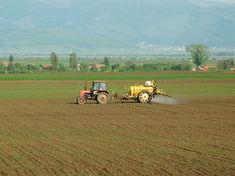

The European fresh produce trade is set to go head to head with the organic lobby over a crucial vote on a new Pesticides Directive at the European Parliament next week.
The Soil Association has emailed supporters calling on them to write to their MEP as a matter of urgency. It wants them to encourage their elected representative to support the environment committee’s amendments to the directive, governing sustainable use of pesticides within the EU. The proposals made by the committee could see chemical crop inputs dubbed pesticides instead of plant-protection products, a term the association said “attempts to put a positive spin on chemicals that are deliberately designed to be toxic”.
The other four amendments the Soil Association is campaigning hard on are the prohibition of pesticide use around public areas including housing, residents to have the right to know what is being sprayed near where they live, the definition of “vulnerable groups” to be extended to include residents subject to exposure over the long term, and for priority to be given to ways of growing crops without using chemical pesticides.
But European trade body Freshfel is calling on MEPs to take into account the impact of these proposals on the availability of high-quality fresh produce. “We fully acknowledge the need for updating EU pesticide legislation, to provide for a continued high level of consumer protection, whilst ensuring that farmers have sufficient available options with which to protect their crops,” said Freshfel’s delegate general Philippe Binard. “But fruit and vegetable producers are finding it increasingly difficult to fight damaging pests as fewer plant protection products become available, and MEPs should take into account this worrying trend.”
Binard highlights the citrus industry as a case in point. “If one considers the situation with insecticides, which are of fundamental importance in southern European citrus-producing regions, more than 65 per cent of those previously available have been lost,” he said. “This loss makes insect control in this region extremely problematic. This example is not alone in highlighting the high number of unprovided uses that fruit and vegetable producers will be faced with, leading to product quality problems. Our sector is particularly vulnerable given the wide diversity in species and their relatively small production areas”.
Paul Chambers, plant-health adviser at the NFU, said some of the proposed amendments make “no sense”, especially given the example of this season’s variable weather. “The environment committee has been the lead committee on this sustainable use of pesticides directive, and a lot of its amendments are just impractical and make no sense. It is calling for a 50 per cent reduction in all pesticide use over 10 years and for a pesticide tax to fund organic farming, which given the bad harvest we have had this year, makes no sense at all.”
Chambers warned that the reduction targets could have a severe impact on all horticulture, from potatoes to orchard fruit. “There are also proposals concerning banning spraying vertical crops alongside water courses,” he said. “But you cannot move an orchard very quickly.”
Growers have adopted a range of integrated crop management strategies to reduce chemical inputs into agriculture, while continuing to provide for consumers. “Where used, plant protection products are applied in a responsible manner according to good agricultural practice, following the principle of as little as possible and only as much as necessary,” said Binard. “Setting arbitrary reduction targets and thereby forcing producers to drastically reduce the use of essential plant protection products will affect the availability of quality produce and would further increase prices.”



